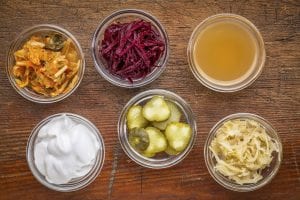 Hey People, Hey People,
Just so we’re on the same page, let’s start by defining probiotics.
Simply put, probiotics are live bacteria and yeasts that work in your favour.
Types of Probiotics
The two main groups of probiotics are:
Lactobacillus: found in fermented foods. May help people who suffer from lactose intolerance or lactose malabsorption.
Bifidobacterium: you can find it in some dairy products. It may help ease the symptoms of irritable bowel syndrome (IBS) and some other conditions.
Saccharomyces boulardii: is a yeast found in probiotics. It appears to help fight diarrhea and other digestive problems.
How (do they work)?
Our bodies are full of gazillions of bacteria – both the good and bad kind. Probiotics are the “good” bacteria that can help improve your health. When you lose good bacteria in your body, for example after you take antibiotics, probiotics can help replace them.
By balancing the gut microflora, probiotics play an important role in regulating digestion and bowel function.
Probiotics are consumed in fermented foods with active live cultures, such as yogurt. They are also available in supplement form.
Why (bother)?
There are several health benefits associated with probiotics:
1. The Lactobacillus species aids in the prevention/treatment of diarrhea and gastroenteritis.
2. Probiotics have been linked to stress and anxiety reduction.
3. Lowers Cholesterol.
4. Helps lower blood pressure.
5. Probiotic bacteria offers protection against infection by harmful strains of bacteria.
6. Aids with Psoriasis and chronic fatigue syndrome
Where (can I find those probiotics)?
You can naturally load up on probiotic goodness by including the following foods in your diet:
· yogurt
· kefir
· buttermilk
· soft or aged cheeses
· kimchi
· unpasteurized sauerkraut
· miso
· tempeh
· some soy beverages
· Probiotic-fortified products, such as juices, chocolates, flour, and cereal.
Hope you’ve found this helpful.
https://www.webmd.com/digestive-disorders/what-are-probiotics#1
https://www.medicalnewstoday.com/articles/264721.php
|